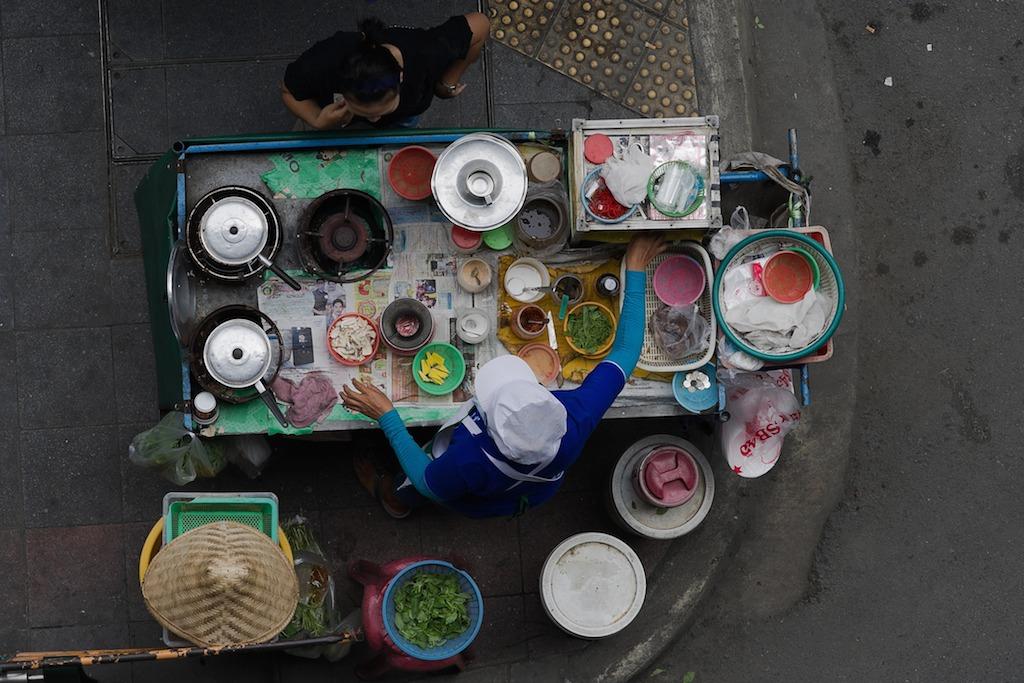A chain of Thai restaurants is storming the West. But it’s no McPadThai
A street food vendor prepares a dish for a customer in Bangkok. The Mango Tree restaurant chain is bringing delicious Thai food to the West.
BANGKOK, Thailand — Move over, Big Mac. Tom yam kung is storming in.
A Thai restaurant that started with one Bangkok outlet has become a global brand in spite of the international fame of Thai cuisine and the fierce competition from family-owned restaurants.
“There’s an international boom for Thai food and we aim to be at the vanguard of that boom,” says Pitaya Phanphenonsophon, CEO of Bangkok-based Mango Tree, already considered one of the world’s biggest Thai restaurant brands.
What 57-year-old Pitaya started in 1994 has grown into 70 locations in 16 countries worldwide. The company expects to double its annual turnover to $100 million by 2015, growing to 100 restaurants. Pitaya plans further expansion throughout Asia, China, the Middle East, and Australia.
He’s opening his first US location in Washington, DC in October in partnership with celebrity chef Richard Sandoval. Other US locations could include Chicago, Denver, Las Vegas, Miami and New York, says Pitaya.
“Our success is down to expanding carefully, choosing great partners, having a unique concept, a sound strategy and, above all, a team which believes it itself,” he says, over a flavorful salad of large, juicy grilled prawns mixed with fragrant lemongrass, yam sauce and fresh greens at Mango Tree’s original restaurant — a former colonial mansion built during the reign of King Rama IV almost 100 years ago in Silom, a vibrant district in the Thai capital. The restaurant was named for a mango tree, still here, planted out front.
Although Pitaya grew up in a restaurant-running family in Bangkok, the business didn’t interest him at first. Enjoying himself as a university student studying economics in Vancouver, he was in no rush to return. But the distance never ended his “love affair” with Thai food.
“Myself and my fellow Asian students missed rice from Thailand. So it all started with a small rice cooker, soy sauce and sweet Chinese sausage. Later, I’d add mushrooms and chicken before moving on to more elaborate recipes,” he says.
During his studies his father passed away and Pitaya was called home to take over the restaurant Coca, which serves Chinese-Thai cuisine. At about the same time, the mansion across the lane became available. Pitaya saw an opportunity to branch out.
“The first goal was to come up with a new concept so we wouldn’t compete with Coca," he says. "My idea was to make it more home-style cooking with contemporary twists.”
Dishes included tom yam scampi, Maine lobster in a rich yellow curry and char-grilled rib eye with chili dipping sauces typical of northeastern Thailand.
“Who wants just to copy and paste an idea? We aren’t looking to have hundreds of restaurants everywhere like some chains, just for the sake of numbers. My vision is to plant a Mango Tree in every major city in the world.”
But not every planting brought financial fruit. He attributes an initial failure in Shanghai to going in too quickly, without lining up the partners.
Opening in London also proved challenging. “We hired a British chef who had top credentials running a restaurant," he recalls. "Soon after, I came into the kitchen one morning and saw him eating one of those British breakfasts of sausages, eggs and beans. I asked, 'Why are you eating that?' And he told me he doesn’t like Thai food. He had to go. You can’t work in a restaurant where you don’t enjoy the food you’re cooking.”
Adding Trevor MacKenzie to the team, another accidental restaurateur, has benefited the business. MacKenzie is managing director, responsible for marketing and expansion, but his previous skills included being a cowboy in Canada’s Rocky Mountains and bartending at night in his native Vancouver.
“I bought into the vision right away,” MacKenzie says. “Nobody gets a franchise very easily. When it comes to partner selection it can take up to two years. What I tell them is this is like a second marriage, so please tell your wife that you’re having an affair — because we're very hands on. I also say if you are looking for glamor, forget it. If you're looking for quick money, also forget it.”
Hitching up with Sandoval in Washington, DC was "a perfect marriage,” MacKenzie notes. Sandoval, with over 30 Latin restaurants across the United States, Europe, Mexico and the Middle East, “shares the same philosophies, passions and vision when it comes to creating brands and continuing to push the envelope with innovation,” Pitaya adds.
“These are indeed exciting times. I don't know what happens when you mix tom yum kung and tequila, but it's bound to get hot, spicy and a little crazy.”
Every day, reporters and producers at The World are hard at work bringing you human-centered news from across the globe. But we can’t do it without you. We need your support to ensure we can continue this work for another year.
Make a gift today, and you’ll help us unlock a matching gift of $67,000!
